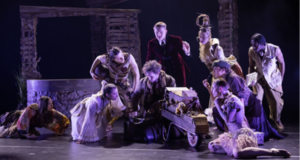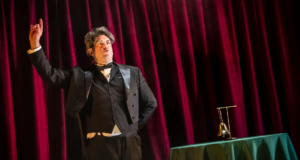A powerhouse performance by Joseph Potter leaves the audience talking about nothing else on the way out.Summary
Rating
Excellent
Sasha and his partner Chet have been invited to his four-year-old niece’s birthday celebration. He doesn’t want to go and isn’t looking forward to the party. He does not get on with his brother Flynn and sister-in-law Niamh. At the event, family history comes to the forefront, with Sasha not quite sharing the same memories as his brother and sister-in-law.
Joseph Potter gives a powerhouse performance, playing all of these characters (and more) with such a flurry of energy that more than once I wondered how he manages to keep going: it was exhausting just to watch. There is an empty set in which at several points Potter is whirling around so enthusiastically you half expect him to hit a wall or end up in the audience. Director Wiebke Green combines the speed and velocity of Potter’s performance with typical Philip Ridley dialogue; fast flowing, sometimes staccato – words as weapons. This is A LOT of fun as we get the contrast between Sasha’s inner monologue of what he would like to say with his actual smiling response, as he offers the normal platitudes expected for family and guests at a party. His vicious humour leads to a lot of extended comedy, including when minor characters so well defined by Potter’s performance get laughs even as they just pop back into a scene a few minutes later.
It is a testament to the writing and to the performance that the audience is invested in the relationships between Sasha and Chet and Sasha and his family. There is a skill in a piece that has an actor twirl, change their body language and accent and instantly be playing the partner of the character they were a second ago. It has to bring the audience along and to make us not just believe in the relationship but to invest in it, and that is achieved here.
The audience has enough material to make their own minds up as to whether Sasha’s memory is accurate or if is he an unreliable narrator, casting a golden eye back on some bad times. Is he harsh – beyond harsh – in his treatment of his brother and sister-in-law? We meet them through his introduction, and through his grudges and they first appear as vapid and shallow. But do events paint them in a better light and suggest the warmth in the relationship they have with Chet might offer a more accurate version of events?
The Poltergeist could do with just a little tightening up, as it relies too much on the performance. As we come to the heart of the play, where the issues within the past are differently remembered, the time to focus on them is taken up by Potter flicking through many different characters. It slightly overstays its welcome, holding the joke a beat too long. This is emphatically not to take away from Potter as he is marvellous, but a few small cuts to the script might keep the momentum going with the story rather than the performance.
But then, it’s a choice isn’t it? If you have an actor of this calibre who is so strong maybe you want to build on that; to use it and to showcase it even at the slight expense of the flow of the story? I can see how that would be a fair choice and how it would work for some, but I felt it detracted rather than added.
This is an excellent evening in the Arcola, driven by a simply superb performer. While a little sharpening might be appreciated, The Poltergeist is still thoroughly excellent. All the chatter on the way out was of the bravura performance by Potter and I cannot disagree with that one bit.
Written by: Philip Ridley
Directed by: Wiebke Green
Produced by: Flying Colours Production
The Poltergeist plays at Arcola Theatre until 5 November. Further information and bookings can be found here.
 Everything Theatre Reviews, interviews and news for theatre lovers, London and beyond
Everything Theatre Reviews, interviews and news for theatre lovers, London and beyond



